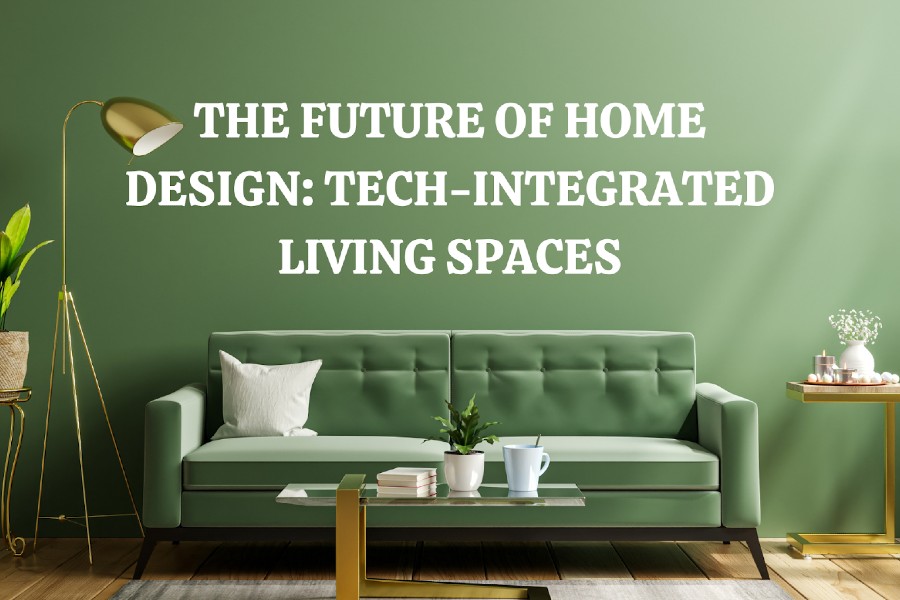
By HWM Partner
Welcome to the era of tech-integrated living spaces, where innovation and convenience converge to redefine home living.
As we step into the future, our living environments are evolving, blurring the lines between physical spaces and digital realms.
Rapid advancements in smart home technology are driving the promise of tomorrow’s homes to be more connected, efficient, and personalized than ever before.
Transformative Impact of Smart Home Technology
Smart Home Hubs and Ecosystems
At the heart of this revolution lies the integration of voice-activated assistants and centralized control systems. With a simple voice command, you can effortlessly manage various aspects of your home, from adjusting lighting and temperature to monitoring security and controlling entertainment systems.
Imagine the convenience of an ecosystem where devices seamlessly communicate, creating a harmonious living experience tailored to your preferences. Even your living room end tables with storage or side tables for sofas could be integrated into this smart ecosystem, allowing you to control hidden compartments or charging stations through voice commands.
IoT Devices Revolutionizing Daily Living
The Internet of Things (IoT) has brought a wealth of connected devices to our homes, transforming mundane tasks into effortless experiences. From smart refrigerators that track expiration dates and suggest recipes based on their contents to robotic vacuums that autonomously clean your floors, household chores are becoming increasingly streamlined.
Even your end tables set of 2 or small end tables for the living room could be equipped with IoT functionality, providing hidden storage compartments or wireless charging capabilities.
Energy Efficiency and Sustainability
Embracing tech-integrated living spaces not only enhances convenience but also contributes to a more sustainable future. Smart thermostats and lighting systems optimize energy consumption by learning your usage patterns and adjusting settings accordingly.
Furthermore, integrating solar panels and energy monitoring systems empowers homeowners to control their environmental impact, reducing carbon footprints while saving on utility costs.
Advanced Home Security Systems
As our homes become increasingly connected, ensuring robust security measures is paramount. Enter the realm of advanced home security systems, where cutting-edge technologies redefine the notion of safety and peace of mind.
AI-Powered Surveillance
Leveraging the power of artificial intelligence, advanced surveillance systems can analyze facial features and behavior patterns, alerting you to any potential threats in real time. With remote monitoring capabilities, you can stay informed and in control, even when away from your home. These systems could even detect unexpected movements around your tall end tables or round end tables for living room, providing an extra layer of security.
The sophisticated integration of AI-powered surveillance and smart locks represents a significant leap forward in home security. Real-time alerts and biometric access provide a new level of safety, complementing the comprehensive smart home ecosystems we discussed earlier.
Smart Locks and Entry Systems
Bid farewell to traditional keys and embrace the convenience of keyless entry systems. Biometric authentication, such as fingerprint or facial recognition, ensures that only authorized individuals can access your home. These smart locks seamlessly integrate with your home security network, providing an additional layer of protection.
Cybersecurity in Smart Homes
As we embrace the benefits of connected living, it’s crucial to address potential cybersecurity risks. Safeguarding personal data and preventing unauthorized access to your smart home devices is a top priority.
By following best practices, such as using strong passwords, regularly updating software, and choosing reputable brands with robust security measures, you can enjoy the advantages of tech integration while mitigating potential threats.
Personalized Living with AI and Machine Learning
Beyond mere convenience and security, tech-integrated living spaces offer a truly personalized experience, catering to individual preferences and needs like never before. Harnessing the power of artificial intelligence and machine learning, your home becomes an intuitive extension of your lifestyle.
Adaptive Learning Systems
Imagine a home that learns your habits and adapts accordingly. From adjusting temperature and lighting settings to optimizing energy consumption, adaptive learning systems continuously evolve to create your ideal living environment. Additionally, predictive maintenance capabilities ensure your home systems operate at peak efficiency, minimizing downtime and maximizing comfort. These systems could even learn your preferences for storage end tables or black end tables, adjusting their functionality and appearance to match your evolving needs.
Adaptive learning systems and smart health monitors showcase AI’s personalization capabilities. By tailoring home environments to user habits, these technologies not only improve comfort but also proactively maintain optimal living conditions.
Health and Wellness Integration
Tech-integrated living spaces extend beyond physical comforts to encompass holistic well-being. Smart health monitors and fitness devices seamlessly integrate into your daily routine, tracking vital signs and providing personalized wellness recommendations. Moreover, indoor air quality sensors and smart humidifiers ensure a healthy and comfortable indoor environment, promoting overall well-being.
Entertainment and Leisure Enhancements
Transform your living space into an immersive entertainment haven with cutting-edge home theater systems and virtual reality spaces. Imagine immersing yourself in exotic locales or engaging in captivating gaming experiences without ever leaving the comfort of your home. The possibilities for leisure and relaxation are limitless in the tech-integrated living spaces of the future.
Future Trends in Tech-Integrated Home Design
As we look ahead, the future of home design promises even more exciting innovations, pushing the boundaries of what we once thought possible. Prepare to be amazed as we explore the emerging trends that will shape the homes of tomorrow.
The Rise of Smart Cities and Connected Communities
In the not-so-distant future, our homes will seamlessly integrate with the broader urban infrastructure, ushering in the era of smart cities. Envision a world where your home communicates with city systems, optimizing energy consumption, traffic management, and resource allocation. Community-wide IoT networks will enable unprecedented connectivity, fostering a harmonious and sustainable living experience.
The rise of smart cities and the adoption of modular smart homes highlight the forward-thinking trends in tech-integrated home design. With sustainable materials and AI-driven design software, the future of home construction promises to be both innovative and environmentally conscious.
Innovations in Smart Home Architecture
Prepare to witness a revolution in home construction as modular and prefabricated smart homes gain traction. These innovative structures not only incorporate cutting-edge technologies but also prioritize sustainability through the use of eco-friendly materials and construction techniques.
Additionally, advancements in AI-driven design software and construction robots will streamline the home-building process, enabling unprecedented levels of customization and efficiency.
The Role of AI in Home Design and Construction
Artificial intelligence will play a pivotal role in shaping the future of home design and construction. From virtual reality experiences that allow you to visualize and customize your dream home to AI-powered design software that optimizes layouts and material usage, the possibilities are endless.
Construction robots, powered by machine learning algorithms, will further revolutionize the building process, ensuring precision and efficiency while minimizing waste.
Challenges and Considerations in Adopting Smart Home Technologies
While the benefits of tech-integrated living spaces are undeniable, it’s important to address the challenges and considerations that accompany this paradigm shift. By acknowledging these potential hurdles, we can pave the way for responsible and equitable adoption of smart home technologies.
Privacy Concerns and Ethical Implications
As our homes become increasingly connected and data-driven, privacy concerns and ethical implications must be addressed. Ensuring transparent data collection practices, obtaining explicit user consent, and adhering to rigorous ethical standards in the development and deployment of AI and surveillance technologies are paramount. Finding the right balance between innovation and privacy protection is a collective responsibility.
While the benefits of smart home technologies are clear, addressing privacy concerns and ensuring affordability are critical. Ethical data collection and the accessibility of smart devices are crucial for widespread adoption.
Cost and Accessibility
While the allure of tech-integrated living spaces is undeniable, affordability remains a significant barrier for many households. Bridging the digital divide and ensuring equitable access to these advanced technologies is crucial for their widespread adoption. Collaborative efforts between industry leaders, policymakers, and communities are necessary to develop cost-effective solutions and inclusive strategies.
Technological Dependence and Reliability
As we increasingly rely on automated systems and connected devices, it’s essential to consider the risks associated with technological dependence. Ensuring the reliability and user-friendliness of smart home systems is paramount to mitigate potential disruptions and frustrations. Robust backup plans and contingency measures should be implemented to maintain essential functionalities in the event of system failures or connectivity issues.
Conclusion: The Evolution of Home Design in the Digital Age
The future of home design is inextricably intertwined with the integration of cutting-edge technologies. From voice-activated assistants and energy-efficient systems to advanced security measures and personalized living experiences, tech-integrated living spaces are poised to revolutionize the way we live. However, as we embrace these innovations, it’s crucial to strike a balance between convenience and ethical considerations, ensuring privacy, accessibility, and reliability are prioritized.
As we stand at the precipice of this transformative era, it’s clear that the homes of tomorrow will be more than just physical structures; they will be intelligent, adaptive, and deeply connected to our lifestyles. Imagine a world where your living space anticipates your needs, optimizes your well-being, and seamlessly integrates with the larger smart city ecosystem.
Become a Harlem Insider!
By submitting this form, you are consenting to receive marketing emails from: Harlem World Magazine, 2521 1/2 west 42nd street, Los Angeles, CA, 90008, https://www.harlemworldmagazine.com. You can revoke your consent to receive emails at any time by using the SafeUnsubscribe® link, found at the bottom of every email. Emails are serviced by Constant Contact








